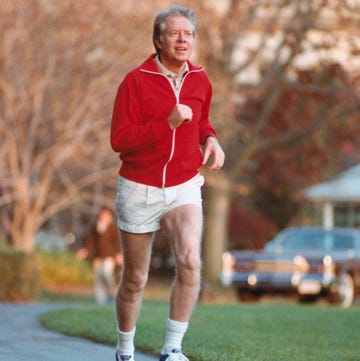In 2013, Mohammad Zafar was overweight, crippled by foot pain, and seeking to regain the fitness he had while serving in the Marines from 1994 to 1998.
He started the 30 Miles in Ramadan Challenge—a mile-a-day running initiative during the holy month of fasting on the Islamic calendar—to help him strengthen his faith and regain his health.
As an extra push, Zafar created a Facebook page for the Ramadan challenge and had his wife take a picture of him before his first mile on July 9, 2013.
The next evening, a neighbor of Zafar’s in Oakdale, Minnesota, asked if he could join. Soon more than 25 families—of all religions—joined in the runs. Zafar has also received Facebook messages from people from countries as far away as Saudi Arabia, Indonesia, and Japan who are participating in the challenge by checking in online. He’s lost count of how many people have joined him on his daily runs during the challenge, and his Facebook community has grown to a small, but active, 374 likes.
During Ramadan, observing Muslims around the world devote time to prayer and attempt to cease unhealthy or excessive habits. To practice self-restraint in keeping with sawm, the Arabic word for fasting and the Fourth Pillar of Islam, they abstain from food, drink, and all forms of immoral behavior from dawn to sunset as a part of their devotion.
This year the holy month began on June 18 and goes until the evening of July 17. The month requires dedication on multiple levels for Zafar.
“Ramadan is a time to reflect and practice patience, discipline, and consistency,” Zafar, 40, said. “The important thing is that you try to get outside and run every day, no matter the pace.”
But with more than 15 hours of daylight, that’s easier said than done.
To prepare for the fast, Zafar wakes up about 2:30 a.m. to eat, hydrate, and make sure he has enough energy to last throughout the day. His go-to predawn meal is a couple of organic fruit smoothies made of frozen strawberries, blueberries, and honeydew, along with some chia seeds.
The running group Zafar leads in his Oakdale neighborhood typically gathers about 9 p.m. and embarks on a one-mile run. Zafar then runs four to five miles on his own before returning home to partake in the iftar or postfast meal, with his wife, Sarah, and their three children.
“You get used to running on an empty stomach,” Zafar said. “I like to think of it as with each mile, I’m moving toward food and water. The run makes everything taste better.”
Zafar immigrated to the United States from Pakistan when he was 13. He enlisted in the Marine Corps one month after graduating from high school in 1994 and served mostly in Japan—often running around the base of Mount Fuji.
Once his active duty ended in 1998, Zafar struggled to readjust to civilian life. Without a daily training regimen, his health deteriorated. He had to quit his job as a security officer at the Mall of America after 13 years when a series of foot injuries—mainly Achilles tendinitis—made it unbearable for him to stand for hours.
Zafar, who now works as a community psychologist, said 30 Miles in Ramadan has made him a runner again. This winter he logged more than 300 miles despite heavy snow and extreme cold. He also said he’s lost 30 pounds, has lowered his cholesterol from 315 to 192, and is off all pain medication.
In addition to Zafar’s personal transformation, the challenge has helped foster a greater sense of community and camaraderie among the families on Helena Road in Oakdale. When Ramadan ends, they continue the group runs.
“Running doesn’t have a race, it doesn’t have a religion,” Zafar said. “It’s for everyone.”

Watch Next

Shoes & Gear











